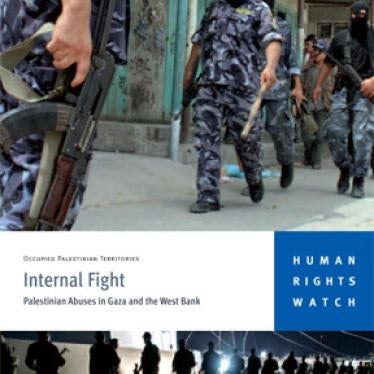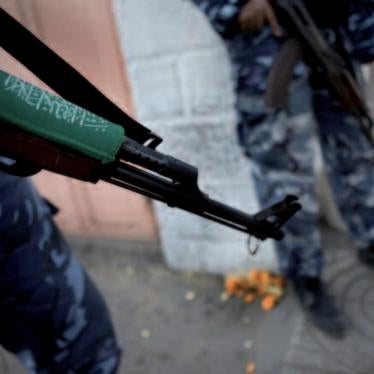(Gaza City) - Hamas should end its attacks on political opponents and suspected collaborators in Gaza, which have killed at least 32 Palestinians and maimed several dozen more during and since the recent Israeli military offensive, Human Rights Watch said in a report released today. Human Rights Watch called on Hamas authorities in Gaza to hold those responsible accountable.
The 26-page report, "Under Cover of War: Hamas Political Violence in Gaza," documents a pattern since late December 2008 of arbitrary arrests and detentions, torture, maimings by shooting, and extrajudicial executions by alleged members of Hamas security forces. The report is based on interviews with victims and witnesses in Gaza and case reports by Palestinian human rights groups.
The spate of attacks began during Israel's military operation, from December 27, 2008, to January 18, 2009, including the summary execution of 18 men in Gaza, most of them suspected collaborators with Israel.It has continued in the three months since, with 14 more killings, at least four of them of people in detention.
"During Israel's attack on Gaza, Hamas moved violently against its political opponents and those deemed collaborators with Israeli forces," said Joe Stork, deputy director of Human Rights Watch's Middle East and North Africa division. "The unlawful arrests, torture, and killings in detention continued even after the fighting stopped, mocking Hamas's claims to uphold the law."
Internal political violence in Gaza and the West Bank is not new. Over the past three years, Hamas and its chief rival, Fatah, which controls the West Bank, have carried out arbitrary arrests of each other's supporters and subjected detainees to torture and ill-treatment.
The violations in Gaza have lessened in April, Human Rights Watch said, but Hamas authorities are still failing to address seriously the crimes by security forces during and after the Israeli attacks.
Hassan al-Seifi, general inspector in Gaza's Interior Ministry, told Human Rights Watch on April 16 that a committee he heads had completed investigations into two deaths in detention. In both cases, the Hamas authorities acted on the committee's recommendations, he said, suspending from duty and filing charges against the police officers involved. In two other cases, the committee is continuing its investigations.
Interviewed on April 15 and 16, a Hamas spokesman, Fawzi Barhoum, and the Gaza Interior Ministry spokesman, Ihab al-Ghusein, told Human Rights Watch that Hamas had explicitly forbidden excessive force by security forces after Israel's military operation. But they said that Hamas forces could not have prevented the killings and shootings by Palestinians during the Israeli attacks due to the chaos of the fighting.
The systematic nature of many of the executions and attacks, and the fact that killings have continued after the Israeli offensive,undercut these assertions, Human Rights Watch said.
"Gazan police were among those targeted by Israeli forces, sometimes apparently unlawfully, but this does not justify Hamas's apparent use of summary execution," Stork said. "The attacks and killings also continued after the Israeli military operation had stopped.
Human Rights Watch urged the Hamas authorities to prosecute vigorously any security force member found to have violated the law.
"Four investigations into 32 deaths are not enough," Stork said.
Most of the 18 Palestinians executed during Israel's military operations were men accused of collaboration with Israel, Human Rights Watch said. Along with others, they had escaped from Gaza's main prison after Israeli aircraft bombed parts of the facility on December 28. Gunmen believed to be from Hamas then tracked down and shot the men.
During the Israeli operations, Hamas security forces also physically attacked known Fatah members, especially those who had worked in the Fatah-run security services of the Palestinian Authority prior to June 2007.The widespread practice of maiming people by shooting them in the legs is of particular concern.
According to the Independent Commission for Human Rights(ICHR), the human rights ombudsman organization of the Palestinian Authority, masked gunmen shot at least 49 people in the legs between December 28 and January 31.
Human Rights Watch interviewed three men, two of them Fatah supporters, who had been shot in the legs during the Israeli attack,apparently by Hamas security forces. The third man said he had been overheard on the street criticizing Hamas. "About 14 of them came for me," the third man said. "They forced me to go from my home to a dark place near a mosque and four of them shot me in the legs, one shot each, but one missed."
Abductions and severe beatings are another major concern,Human Rights Watch said. According to the ICHR, unidentified perpetrators broke the legs and arms of 73 Gazan men from December 28 to January 31. Human Rights Watch interviewed three Fatah supporters, all men, who were violently assaulted by men believed to be from Hamas.
During periods of armed conflict, Hamas, as the effective authority in Gaza, is entitled to take appropriate measures to ensure security,including detaining individuals who pose genuine security risks. But physical abuse, including torture, maimings, and summary executions, is strictly forbidden under all circumstances. Under international law, detentions cannot be arbitrary or target a group or category of persons for political as opposed to genuine security grounds.
On the other side of the internal Palestinian divide, the Fatah-run authorities in the West Bank have increased repressive measures against Hamas members and supporters there, Human Rights Watch said. From December 28 to February 28, Palestinian human rights groups recorded 31 complaints of residents who said they had been tortured by Fatah-led security forces. They also recorded one known death in custody and the arbitrary detention of two journalists from a private television station considered pro-Hamas.
United States and European Union donors who finance and train Fatah-run forces in the West Bank have expressed no public criticism of these serious human rights violations.
"Western governments that support and finance the Fatah authorities in the West Bank have remained publicly silent about the arbitrary arrests and torture against Hamas members and others," Stork said.
The abuses committed in both Gaza and the West Bank violate Palestinian law. The Palestinian Basic Law, considered to be the interim constitution, guarantees the right to equal treatment before the law,freedom of expression and association, and fundamental due process rights. It prohibits torture and other mistreatment.
Both the Hamas and Fatah authorities claim to be the legitimate heads of the Palestinian Authority, which has repeatedly pledged to respect international human rights standards. As a political party, Hamas has publicly indicated on several occasions that it would respect international human rights norms.








